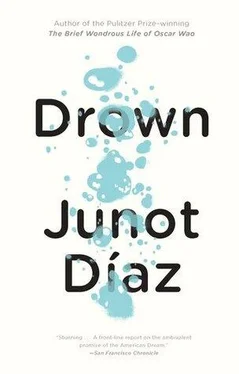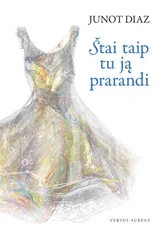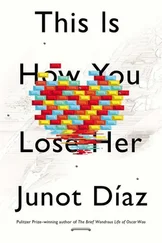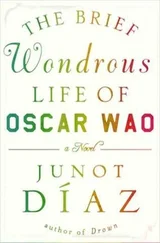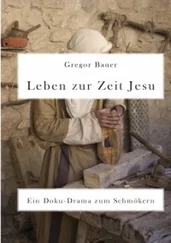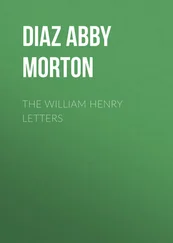Even on his first disorienting morning, as an aged Latina snapped the sheets from the bed and emptied the one piece of scrap paper he’d thrown in the trash can, Papi pushed himself through the sit-ups and push-ups that kept him kicking ass until his forties.
You should try these, he told the Latina. They make work a lot easier.
If you had a job, she said, you wouldn’t need exercise.
He stored the clothes he had worn the day before in his canvas shoulder bag and assembled a new outfit. He used his fingers and water to flatten out the worst of the wrinkles. During the years he’d lived with Mami, he’d washed and ironed his own clothes. These things were a man’s job, he liked to say, proud of his own upkeep. Razor creases on his pants and resplendent white shirts were his trademarks. His generation had, after all, been weaned on the sartorial lunacy of the Jefe, who had owned just under ten thousand ties on the eve of his assassination. Dressed as he was, trim and serious, Papi looked foreign but not mojado.
That first day he chanced on a share in an apartment with three Guatemalans and his first job washing dishes at a Cuban sandwich shop. Once an old gringo diner of the hamburger-and-soda variety, the shop now filled with Óyeme’s and the aroma of lechón. Sandwich pressers clamped down methodically behind the front counter. The man reading the newspaper in the back told Papi he could start right away and gave him two white ankle-length aprons. Wash these every day, he said. We stay clean around here.
Two of Papi’s flatmates were brothers, Stefan and Tomás Hernández. Stefan was older than Tomás by twenty years. Both had families back home. Cataracts were slowly obscuring Stefan’s eyes; the disease had cost him half a finger and his last job. He now swept floors and cleaned up vomit at the train station. This is a lot safer, he told my father. Working at a fábrica will kill you long before any tíguere will. Stefan had a passion for the track and would read the forms, despite his brother’s warnings that he was ruining what was left of his eyes, by bringing his face down to the type. The tip of his nose was often capped in ink.
Eulalio was the third apartment-mate. He had the largest room to himself and owned the rusted-out Duster that brought them to work every morning. He’d been in the States close to two years and when he met Papi he spoke to him in English. When Papi didn’t answer, Eulalio switched to Spanish. You’re going to have to practice if you expect to get anywhere. How much English do you know?
None, Papi said after a moment.
Eulalio shook his head. Papi met Eulalio last and liked him least.
Papi slept in the living room, first on a carpet whose fraying threads kept sticking to his shaved head, and then on a mattress he salvaged from a neighbor. He worked two long shifts a day at the shop and had two four-hour breaks in between. On one of the breaks he slept at home and on the other he would handwash his aprons in the shop’s sink and then nap in the storage room while the aprons dried, amidst the towers of El Pico coffee cans and sacks of bread. Sometimes he read the Western dreadfuls he was fond of — he could read one in about an hour. If it was too hot or he was bored by his book, he walked the neighborhoods, amazed at streets unblocked by sewage and the orderliness of the cars and houses. He was impressed with the transplanted Latinas, who had been transformed by good diets and beauty products unimagined back home. They were beautiful but unfriendly women. He would touch a finger to his beret and stop, hoping to slip in a comment or two, but these women would walk right on by, grimacing.
He wasn’t discouraged. He began joining Eulalio on his nightly jaunts to the bars. Papi would have gladly shared a drink with the Devil rather than go out alone. The Hernández brothers weren’t much for the outings; they were hoarders, though occasionally they cut loose, blinding themselves on tequila and beers. The brothers would stumble home late, stepping on Papi, howling about some morena who had spurned them to their faces.
Eulalio and Papi went out two, three nights a week, drinking rum and stalking. Whenever he could, Papi let Eulalio do the buying. Eulalio liked to talk about the finca he had come from, a large plantation near the center of his country. I fell in love with the daughter of the owner and she fell in love with me. Me, a peon. Can you believe that? I would fuck her on her own mother’s bed, in sight of the Holy Mother and her crucified Son. I tried to make her take down that cross but she wouldn’t hear of it. She loved it that way. She was the one who lent me the money to come here. Can you believe that? One of these days, when I got a little money on the side I’m going to send for her.
It was the same story, seasoned differently, every night. Papi said little, believed less. He watched the women who were always with other men. After an hour or two, Papi would pay his bill and leave. Even though the weather was cool, he didn’t need a jacket and liked to push through the breeze in shortsleeved shirts. He’d walk the mile home, talking to anyone who would let him. Occasionally drunkards would stop at his Spanish and invite him to a house where men and women were drinking and dancing. He liked those parties far better than the face-offs at the bars. It was with these strangers that he practiced his fledgling English, away from Eulalio’s gleeful criticisms.
At the apartment, he’d lie down on his mattress, stretching out his limbs to fill it as much as he could. He abstained from thoughts of home, from thoughts of his two bellicose sons and the wife he had nicknamed Melao. He told himself, Think only of today and tomorrow. Whenever he felt weak, he’d take from under the couch the road map he bought at a gas station and trace his fingers up the coast, enunciating the city names slowly, trying to copy the awful crunch of sounds that was English. The northern coast of our island was visible on the bottom right-hand corner of the map.
He left Miami in the winter. He’d lost his job and gained a new one but neither paid enough and the cost of the living room floor was too great. Besides, Papi had figured out from a few calculations and from talking to the gringa downstairs (who now understood him) that Eulalio wasn’t paying culo for rent. Which explained why he had so many fine clothes and didn’t work nearly as much as the rest. When Papi showed the figures to the Hernández brothers, written on the border of a newspaper, they were indifferent. He’s the one with the car, they said, Stefan blinking at the numbers. Besides, who wants to start trouble here? We’ll all be moving on anyway.
But this isn’t right, Papi said. I’m living like a dog for this shit.
What can you do? Tomás said. Life smacks everybody around.
We’ll see about that.
There are two stories about what happened next, one from Papi, one from Mami: either Papi left peacefully with a suitcase filled with Eulalio’s best clothes or he beat the man first, and then took a bus and the suitcase to Virginia.
Papi logged most of the miles after Virginia on foot. He could have afforded another bus ticket but that would have bitten into the rent money he had so diligently saved on the advice of many a veteran immigrant. To be homeless in Nueva York was to court the worst sort of disaster. Better to walk 380 miles than to arrive completely broke. He stored his savings in a fake alligator change purse sewn into the seam of his boxer shorts. Though the purse blistered his thigh, it was in a place no thief would search.
He walked in his bad shoes, froze and learned to distinguish different cars by the sounds of their motors. The cold wasn’t as much a bother as his bags were. His arms ached from carrying them, especially the meat of his biceps. Twice he hitched rides from truckers who took pity on the shivering man and just outside of Delaware a K-car stopped him on the side of I-95.
Читать дальше
